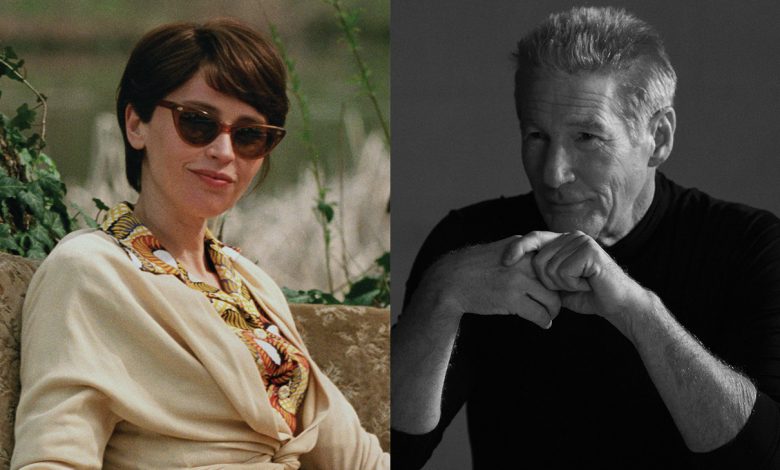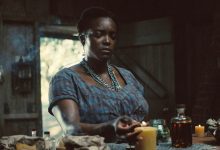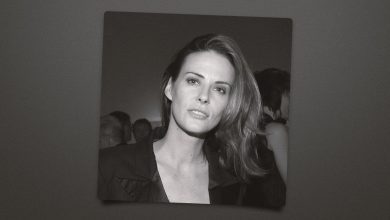Richard Gere and Felicity Jones Look Back and Look Ahead

Richard Gere
Richard Gere has been a bona fide movie star for nearly half a century. But he didn’t necessarily set out to be.
“I was a little snobbish about movies,” says the youthful 75-year-old. “Certainly, I had a fascination and loved movies. But I also loved being in the theater.”
Gere points to his starring role in Sam Shepard’s 1975 play Killer’s Head as a key point in his transition to the big screen.
“It was a 30-minute monologue of this cowboy fuck-up who was in the electric chair, and it was his last thoughts before he was electrocuted,” he says, part of a conversation he had with THR for a new episode of the Awards Chatter podcast. “That was a decisive moment for me, of connecting with a more or less contemporary character. That in many ways was very filmic, albeit from a Sam Shepard point of view. It was capturing a moment. It wasn’t a classic, it wasn’t a rock musical, it wasn’t in the repertoire of regional theaters. It was its own creature.”
Adds Gere, “I think that put me in that category as, ‘Oh, he’s one of those guys.’ ”
American Gigolo (1980)cemented his place there. Gere’s collaboration with writer and director Paul Schrader on the neo-noir drama established him as a big-screen leading man. Four decades later, the duo has once again teamed up for Oh, Canada, an adaptation of Russell Banks’ 2021 novel Foregone.
Gere looks back at the defining roles of his career as he shares his hope for a return to theatrical releases.
In terms of acting entering the picture, something happened at University of Massachusetts Amherst. You didn’t finish because of another opportunity.
Strangely, I was a philosophy major, and I was minoring in ancient Greek. Don’t ask me why, but that’s what I was pointed toward. I got involved with the acting school, and somewhere in my sophomore year, I went with an actor friend of mine to an audition in Boston for the Eugene O’Neill Provincetown Playhouse, and I ended up getting the job. I got the call in my dorm room saying that they loved what I did, and would I come and join them for the summer, and I remember getting that rush of energy — “This is what I’m going to be doing in my life” — and feeling like a rocket taking off.
You ended up, at 21, in New York, basically on Broadway — I don’t know if a lot of people realize your roots are largely in musical theater.
I had rock bands. I played guitar and piano and my hair was down to my tits, and I had a lot of Indian jewelry on. It was a time in New York when there were a lot of rock operas, and it was actually the first audition I had [in New York]. One of the directors I had worked with in the theater, his wife was a literary agent, and she set me up at an audition for one of these rock operas, and I got the job. This rock musical never really happened, but it was a springboard to other things. I started as an understudy in Grease and then became the lead in Grease, and then went to London with Grease.
The process of ending up onscreen in 1978’s Days of Heaven, though, was a very drawn-out thing.
[Terrence Malick], he’s brilliant for sure, but he’s also eccentric and he has his own process, and he was trying to find three actors that fit. I don’t know how many other actors and actresses I tested with or we just met — this is months and months of this — and finally, I said to Terry, “I can’t do this anymore. Make a decision or kill us, one or the other.” He called and said, “I want you to do this.” This was my first film, so it was like, “Wow.” I could feel that rush, too, of “OK, that’s what I’m going to be doing. The next part of my life is making movies.” And it was.
American Gigolo is an interesting bookend with Oh, Canada. It was the third film Schrader directed, and it sounds like at first you were in, then you were out, and then you were in?
I don’t think I was ever in. My memory is different than Paul’s. If we were in the same room together, he’d say, “You’re completely full of shit. That’s not what happened.”
1980’s American Gigolo. Paramount/Courtesy Everett Collection
So what happened?
I’m sitting in a rented house in Malibu and I’m pretty tired. I’ve been making films back-to-back, and I get a call from Paul Schrader. It was a big deal — Paul’s never lost that quality of being a big deal. Paul called, and there was this huge urgency, “I want you to do this film, but you’ve got to tell me today.” And I laughed. I said, “Paul, come on. Of course I respect you. Let me read it.” [He said,] “I’ll let you read it. But I’ve got to know by the end of the day.” I said, “Paul, it’s not going to happen.” He had the script sent over to me and I read it. It was a very good script. I said, “Paul, you’ve got to give me one night to think about this.” Very reluctantly, he let me have one night. My process is a slow process to say yes to something. I want time to think about it and work on it and let it slowly take me over. He said, “We’re shooting in two weeks.” The next morning, I took a deep breath and took a shot because I liked the script and I liked him. I said, “OK, let’s go.”
In the years between An Officer and a Gentleman and the double whammy in 1990 of Internal Affairs and Pretty Woman, there was a period where you had a few projects that didn’t click, and I wonder if that was scary.
I think it was a subconscious choice on my part to step back. I said, “Enough. I don’t really like all this attention.” And I reacted like a wild animal. “I don’t want to be looked at.” I made some choices, not that I’m ashamed of it, but there were choices not to be in the big game, they were to be in a smaller game. I’ve never done anything and said, “Nah, fuck it. I’ll just take the money and walk through this.” Even things that I don’t think are very good films, the motivation to do them and the work ethic was the same.
Do you know what Looking for Mr. Goodbar, An Officer and a Gentleman, Pretty Woman, Primal Fear, Unfaithful and Chicago all have in common?
No.
For each of them, at least one of your co-stars was either nominated for or won an Oscar. I think you bring out the best in people you work with. And yet somehow these schmoes in the Academy haven’t gotten it right with you yet.
You want to know the truth? I love actors, and I only want them to be the best they can possibly be. I don’t understand some actors who, once they do their bit, walk away. I said, “I’m there to the bitter end. I’ll do offlines for anybody.” And I’m there feeding energy into it. I know all these actors can give incredible performances, and I want to be part of that.
Richard Gere in 1990’s Pretty Woman. Buena Vista/courtesy Everett Collection
Forty-four years after you and Schrader did American Gigolo, you came together again for Oh, Canada. Leonard Fife is a dying documentary filmmaker coming clean about his life during this final interview. What was the most challenging aspect of playing this guy?
I don’t think he’s really knowable, and I don’t think he should be. We’re all complicated people. I’ve never met a simple person in my life. Even his self-direction, to tell the truth, is questionable. And even the truths that he tells — some of them are embarrassing and shameful — may not be true. I think what’s interesting is that he’s trying to communicate something, and he’s insistent that his wife be party to this. He insists that she’s the witness. The documentary’s a vehicle; he really doesn’t give a damn about it. He says, “I can tell the truth when the camera’s on me. But other than that, I don’t care about it. This ain’t my movie anyhow, it’s theirs, and I don’t care. Once this is done, they can do whatever they want. What’s important is that you are here.”
We’re now 50 years into your screen career. What’s your state of the union at the moment?
I’ve been in a phase for the last, I don’t know how long, 10 movies, of small, independent films. When I started making movies, I was making the same movies, but they were studio pictures. Studios made big movies for everybody. And they made programmers, they used to call them, genre movies. Then they made some things that are maybe a little more challenging and smaller budget, but they were part of their business plan. Also, their raison d’être was making these more difficult movies that went to Cannes and Venice. These are all independent films now. I think it’s been accelerated because of COVID, that finding the money to make these movies and screens to put them on is really a challenge. I’m happy to keep making them, but how are people going to see them? I hope it’s not destined to be only at home, where you’re lying in bed and you can put it on pause. I am not happy with that. I still think that there’s a communal, semi-spiritual experience of going to a theater with strangers, in the dark, and you give up control. I’m sad that that might go away.
***
Felicity Jones
“Everything comes back to Chalet Girl,” says Felicity Jones.
The Brit is giggling in the private bar of a Soho hotel in central London festively decorated with bright red baubles and mistletoe ahead of the holidays. The 41-year-old — now a seasoned, Academy Award-nominated actor — is talking about the difficulty of her breakout role in Phil Traill’s 2011 frilly, snow-clad rom-com. “There was so much partying on that film, but I’d always just have to leave early because I knew that I’d have a day of snowboarding ahead of me,” Jones tells The Hollywood Reporter, unexpectedly. “And doing it with a headache was so much harder.”
The experience laid the groundwork, she explains, for a career marked by technically demanding performances. Her other most challenging project? The … very differently oriented The Brutalist, Brady Corbet’s three-and-a-half-hour, architecture-themed immigrant drama in which she stars as a disabled, Hungarian Holocaust survivor. The film was written by Corbet and his partner of 12 years, Mona Fastvold. With an intermission halfway through and a — wait for it — budget under $10 million, The Brutalist was the talk of this year’s Venice Film Festival; Corbet scooped up the best director award, and his stars, Adrien Brody and Jones, set the pace for what are shaping up to be fierce acting races. Jones is already off to a good start, having notched a Golden Globe nomination for the role, as have Brody and co-star Guy Pearce.
“It is an industry that doesn’t conform to many rules, so you just never know,” Jones, who earned an Oscar nod for her showing as Jane Hawking in The Theory of Everything (2014), says of the movie’s awards buzz. “You have to have a certain amount of peace that when you make the decision to do something, you give it everything. And what will be, will be.”
And give it everything she does. Jones puts on a mesmerizing display as Brody’s wife, Erzsébet Tóth, who comes into the picture only after the intermission but, as she aptly puts it, haunts the first half of Corbet’s ambitious film. “She is there in spirit. And when we meet her in the second half, I feel we intuitively know the kind of woman that she is. You feel there’s a strength and a power. [But] it’s such a shock that physically she is manifesting so much of the trauma that she has been through.”
The Brutalist was a “juggernaut to get made,” according to Jones (her involvement began two years before it was shot). It follows a fictional Hungarian Jewish architect, László Tóth, fleeing Europe after World War II to build a new life in America. He falls into the circle of a wealthy businessman, Harrison Lee Van Buren (Pearce), who commissions an enormous community center from Tóth. Erzsébet, once a journalist, is finally able to join her husband in the States thanks to help from Van Buren’s lawyer friends. But unbeknownst to Brody’s character until she arrives, she is wheelchair-bound — a result of osteoporosis, a bone disease caused by the starvation Erzsébet suffered in a Nazi concentration camp.
“It was just a fascinating way of exploring the character,” Jones says of acting in a wheelchair. She spoke to an osteoporosis specialist and rigorously researched the illness.
“It’s another facet of Erzsébet that she hasn’t wanted to tell László,” says Jones. “She doesn’t want that to be a defining feature of their relationship.” Theirs is a marriage bound by love and the couple’s Jewish faith against a cruel political backdrop. “Her belief in God is intertwined with her love for László,” Jones says. “Often in relationships where both people had survived the Holocaust, it was very hard for the relationship to work because there was so much trauma on both sides. And you see László and Erzsébet dealing with that. They’re both searching for some kind of emotional security — they’re clinging on to each other for dear life.”
Brody and Jones hadn’t worked together before The Brutalist. “But it felt like we’d worked together for hundreds of years,” she recalls. “It was that kind of dynamic. We both have an attention to detail, we like to throw things out there. We like to improvise, and that’s where the humor often comes from. Particularly with the accent and the Hungarian speaking, how much focus was needed … You really have to concentrate to pull it off,” she adds with a half-laugh, half-sigh.
The accent and physicality are specific enough to make one wonder just who Jones had in mind when she was crafting Erzsébet; the magic conjured is just too believable, too informed. “There was a great resource from the British Library,” Jones reveals, “which has an archive of people talking about their experiences of surviving the Holocaust. And there was a woman called Heidi Fisher who had come to England and had grown up in a similar socioeconomic background to Erzsébet. I used her voice as a template, and managed to find some great archive pieces of her talking.”
Jones has a knack (or a taste?) for playing the powerful woman behind a brilliant but troubled man: the wife of Eddie Redmayne’s Stephen Hawking, for example, or even the daughter to Mads Mikkelsen’s scientist character in Rogue One: A Star Wars Story. As it turns out, this has been pointed out to Jones a few times over the years. “I just can’t help myself,” she says, explaining that it is often a resistance she finds in these powerhouse women that draws her in; nothing is more tempting than their show of strength. “You always want to get beyond the labels of wife or mother, what underpins that person. But I always seem to be attracted to characters that have defiance in them. I have a production company [Piecrust Productions] and that’s at the root of the company, navigating this idea of defiance,” she adds. “When there’s a moment of defiance in the script that I’m reading, then I think, ‘Oh, this one’s definitely for me.’ ”
That moment comes in The Brutalist when Erzsébet confronts their patronizing hosts in one of the film’s more fireworks-filled scenes. “Brady and I talked about this superhero transformation that she has. She definitely rises up,” Jones says with a smirk. “Being in America, her health actually improves through the diet, the emotional warmth and the joy of being with this person that she loves. She finds this strength — she has the mental strength when we meet her — but she needs to get the physical strength to really nail Van Buren. In that moment, we get glimmers of what her life was before the camps. … It’s pure cinema with the shoe coming off.”
What was it like on set with Corbet? “He brings such vulnerability to what he does,” she says of her director. “There are no hidden corners to Brady. He’s making stories that he really wants to make, for all the right reasons. So much of this film is about him and Mona. They’re both similar to Erzsébet and László. They’re both directors, they’re both artists, and the film is a portrait of a marriage, in many ways.”
As one of the first people to get hooked on The Brutalist, what does she think makes this movie worthy of all the hype? “Instantly, from reading the script, I thought it was special. It had so many different facets in terms of the story, but also just looking at the page, you could see there was such a technical side to this film. Within the first few pages of the script, you have these two columns of dialogue and this cacophony of sound, of people speaking over each other. It never lets up.
“There’s a real, studious side to the film, but there’s a real punk quality to it, and I thought it was this combination: of being so true to history, but [having] a Brechtian quality. It reminds you that you are an audience, that you are an observer of something, and that in many ways, you are part of it. I loved that it was a story about survival, and it wasn’t just physical survival. How do you survive with your beliefs and your dreams intact when circumstances around you are making that so difficult?”
Source: Hollywoodreporter
Related Posts
- Roundball Rocked: With NBA Return Looming, NBC Purges Scripted Roster
- SoundCloud Says It “Has Never Used Artist Content to Train AI Models” After Backlash on Terms of Service Change
- Fox News’ Camryn Kinsey Is “Doing Well” After Fainting on Live TV
- Kerry Washington and Jahleel Kamera in 'Shadow Force.'
Courtesy of Lionsgate
…
- This Alternative Artist Landed a Top-20 Chart Debut With an Album Made Almost Entirely on His Phone





